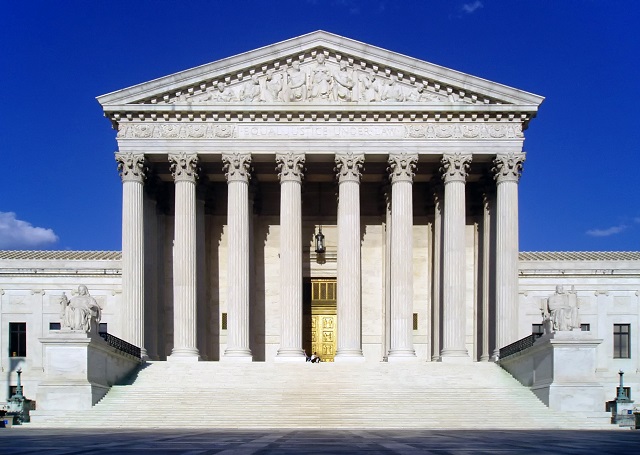This article was originally printed in Raising the Bar, the publication of the Women’s Bar Association of the District of Columbia. It is reproduced here with the WBA’s and the author’s permission.

In an earlier piece published here, I provided an overview of two cases before the U.S. Supreme Court during its 2015 Term. Those cases, in substance, challenged the ability of Native nations to protect their communities from those who commit sexual assault and intimate partner violence. Both cases have now been resolved, with outcomes favorable to Native nations’ interests.
The Dollar General decision: Dollar General Corporation v. Mississippi Band of Choctaw Indians, the case involving the alleged sexual abuse of a Native youth by the non-Native manager of a Dollar General store, was resolved through a per curiam opinion issued after the passing of Justice Antonin Scalia. The opinion affirmed the lower court’s decision by a 4-4 tie vote.
The U.S. Court of Appeals for the Fifth Circuit held that the Choctaw Tribal Court has civil jurisdiction over the non-Native conduct for which the youth and his parents sought damages in tribal court, since the conduct arose from the consensual relationship between Dollar General and the Choctaw Tribal Government. The Fifth Circuit’s rationale was that, because the youth was under the store manager’s supervision as a result of the youth’s participation in a youth internship program operated and funded by the Choctaw Tribal Government and because Dollar General had expressly agreed to participate in the job training program and consented in lease documents to the application of tribal law and tribal court jurisdiction, Dollar General had consented to the exercise of tribal jurisdiction over a workplace sexual assault suit arising directly from its participation in the internship program. Dollar General, in the court of appeals’ view, readily could have anticipated that sexual molestation of an intern by its store manager would be actionable under Choctaw law.
This affirmance is grounded in the Supreme Court’s earlier decision in Montana v. U.S., 450 U.S. 544 (1981). In Montana, the Supreme Court held generally that “Indian tribes cannot exercise power inconsistent with their diminished status as sovereigns,” but also created an exception that permits a tribe to exercise civil jurisdiction over non-members engaged in consensual relationships with the tribe or its members on tribal land if there is a nexus between the nonmember’s relationship with the tribe or tribal members and the claims pled.
Dollar General and the alleged abuser now will be required to defend themselves against the civil suit in the Choctaw Tribal Court, but these defendants cannot be criminally prosecuted by the Choctaw. That is because, under other Supreme Court precedent, Oliphant v. Suquamish Indian Tribe, 435 U.S. 191 (1978), a Native nation is precluded from prosecuting a non-Native defendant for crimes committed against a Native person, even when those crimes take place on land held in trust for and within the reservation of the Native nation, unless Congress expressly authorizes such criminal prosecutions.
The Bryant decision: The second case, United States v. Bryant, was resolved unanimously by the justices in an opinion written by Justice Ruth Bader Ginsburg. Bryant holds that domestic abuse convictions that have been obtained in tribal court proceedings conducted in compliance with the Indian Civil Rights Act of 1968 (“ICRA”) lawfully may be considered in connection with the felony repeat-offender provisions of the Violence Against Women and Department of Justice Reauthorization Act of 2005 (“VAWA”). Bryant offers resounding support for the principle that Native nations are sovereign bodies distinct from the United States and not constrained by the U.S. Constitution, in forcefully rejecting the defendant’s constitutional challenge to the prosecution’s use of his two earlier, uncounseled misdemeanor domestic abuse convictions in Northern Cheyenne Tribal Court.
The Bryant opinion begins with a sobering recitation of statistics with respect to the rates of intimate partner violence experienced by Native women. It then relates the historical limitations on tribal, state and federal jurisdiction in Indian Country that have permitted serial domestic violence offenders to escape serious punishment. Bryant characterizes Section 117(a), which targets such serial offenders (making it a federal crime for any person to commit a domestic assault within Indian country if the person has at least two prior final convictions for domestic violence rendered in federal, state or Indian tribal court proceedings), as “’the first true effort to remove these recidivists from the communities that they repeatedly terrorize.’” 579 U.S. __ (2016) slip op. at 6 (quoting from the dissent of Owens, J., from the U.S. Court of Appeals for the Ninth Circuit decision denying rehearing en banc in the case).
That stage-setting complete, the opinion elaborates on the Justices’ rationale that use of the defendant’s uncounseled tribal-court convictions as predicate offenses in a Section 117(a) prosecution did not violate the defendant’s rights. In the court’s view, simply put, those convictions were valid when entered—since the Sixth Amendment right does not apply in tribal-court proceedings—and they retained that valid status when invoked in a subsequent proceeding.
Justice Clarence Thomas, while agreeing that Supreme Court precedent dictates Bryant’s result, filed a concurring opinion to express his view that “[i]t is time that the Court reconsider these precedents.”
The concurring opinion characterizes those precedents as based on “amorphous and ahistorical assumptions about the scope of tribal sovereignty,” and, contradictorily, based on the “fiction” that Congress has plenary “unfettered power” and “all-encompassing control” over Native nations.
In upholding the felony repeat-offender provisions of the VAWA, the Court preserved what is widely viewed by Indian country and federal prosecutors as a crucial law enforcement tool against perpetrators of intimate partner violence.
WBA member Eva Marie Carney is a securities regulatory partner with the Washington, D.C. office of Richards Kibbe & Orbe LLP, an enrolled member of the Citizen Potawatomi Nation and an elected representative to the Citizen Potawatomi Nation’s Legislature.
